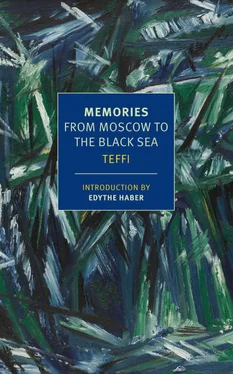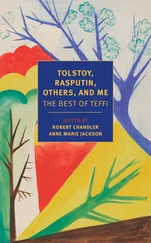Many went to Odessa—Teffi among them. The new arrivals resumed their feverish social life, gambling and drinking through the night, while the eternally optimistic writers and journalists again set about starting a newspaper. The forces of destruction, however—at first taking the form of the notorious Odessan gangsters (made famous by Isaac Babel)—were never far below the surface. And when in April the Bolsheviks began their incursion, people resumed their exodus, Teffi barely escaping on a rickety ship, the Shilka , on which she hoped to sail to Vladivostok and from there to return home.
While on the ship Teffi witnessed the dissolution of her old world on a more individual level. A furnace stoker with whom she struck up a conversation on the deck one night revealed that he was in disguise—that he was actually a Petersburg youth who had visited her apartment, where they “talked about stones, about a yellow sapphire.” Since then his entire family had perished and now he planned to go to Odessa to fight the Bolsheviks. Teffi remembers the evenings in Petersburg: “Languid, high-strung ladies, sophisticated young men. A table adorned with white lilac. A conversation about a yellow sapphire…” Then she imagines the execution awaiting this boy, who will “rest his weary shoulders against the stone wall of a black cellar and close his eyes…” If the stoker marks the demise of the aestheticized pre-revolutionary artistic world, a group of young officers who boarded the Shilka in the Crimean city of Sevastopol embodies the disappearance of the aristocratic military culture: “They were handsome and smart and they chatted away merrily, casually coming out with the odd word of French and singing French songs with perfect accents.” Yet they were soon to be mowed down in battle, Teffi remarks, “to meet their death with courage and grace.”
After the Shilka docked in the large port city of Novorossiisk, Teffi was invited to attend a performance of her works in Yekaterinodar, a last bastion of imperial pomp. On the train there she shared a car with “haggard” and “worn-out” soldiers and officers, who—in stark contrast to the jolly officers on the Shilka —bared the true, horrifying face of war. One of them told the story of a colonel who, after witnessing the torture of his wife and children, wreaked revenge on captured Bolsheviks time and again: “He would sit on the porch drinking tea and have the prisoners strung up in front of him, first one, then another, then another. While he carried on drinking tea.” Another soldier declared him “insane,” but his companion demurred, insisting that “In his world, in the world he lives in, he’s perfectly normal.” Within the bestial conditions of war, the usual rules governing human behavior have been suspended. Although Teffi is obviously more sympathetic to the Whites, she shows both sides caught in the horror. Whether it is the female “commissar H” at the Russian border town (also “deranged”), who “sits on her porch, sentencing and shooting,” or the crazed White colonel, the basest instincts have conquered these people. Later that night the voice of a soldier, in combat since the beginning of the World War, summed up the horror: “I can’t go on anymore. Since 1914 they’ve been torturing me, torturing me, and now… now I’m dead. I’m dead…”
The contrast between these living corpses and the military elite Teffi then encountered at a theater in Yekaterinodar could hardly be greater. After the dark vision of the fighting men, the generals and ministers seemed to be living a masquerade. The glitter was on full display: “Gold and silver lace, the glint of uniforms—true splendor.” At the end of the performance, the author came out for a bow, Teffi commenting ruefully: “My last bow to a Russian audience on Russian soil.” This gathering was also, in a sense, a “last bow” for the tsarist elite, soon to vanish forever from Russia.
Teffi conjures up a final, chilling image that encapsulates the annihilation of her old bohemian world, with its love of pose, of playing with life. As her train approached the Caucasus resort of Kislovodsk, she spied within the idyllic landscape “a scrap of rope. It is a gallows.” She notes that it was there that they hanged “Ksenya G, the famous anarchist,” whom she remembers: “Bold, gay, young, beautiful—always chic,” one of an anarchist group whom everyone considered to be “fakes and braggarts. Not one of us had taken them seriously.” But revolution played its tragic trick on Ksenya G and killed her in good earnest: She “had stood here, in this very spot, smoking her last cigarette and screwing her eyes up as she looked at her last sun. Then she had flicked away the cigarette butt—and calmly thrown the stiff noose around her neck.”
Counterpoised to such visions of death and destruction, Teffi depicts too those who managed to survive the whirlwind of revolution more or less morally intact. A characteristic typical of Teffi’s comic, anti-heroic world, and one that allowed some to endure, is a kind of lighthearted adaptability. Thus, there are the “elegant young men in smart suits” on the Shilka who, although they at first treat the demand that they haul coal as a joke, soon begin “entering into their new role”—not only carrying the coal, but adopting the stevedores’ language and songs. They have, to be sure, only replaced one role with another, but that adaptability would prove essential for future émigrés, compelled again and again to reinvent themselves.
In general, though, women are the best survivors—not because of unusual valor or nobility, and certainly not because of political principles, but because of their ability to maintain such outward appearances as are necessary for human life, while at the same time adapting to shifting circumstances. With a combination of irony and affection, Teffi describes women running to the hairdresser or buying the last pair of shoes before their lives fall apart. “O sweet and eternal femininity!” the narrator exclaims, comparing such women to edelweiss in a snowy wasteland. She tells of meeting one cheerful soul on a street in Novorossiisk who asks her to admire her dress made of “remarkably nasty muslin.” The woman explains that it is made of “medical gauze,” which, although not very strong, is “cheap, and it comes nice and wide.” Teffi imagines that even “during Pompeii’s last minutes, there had been edelweisses hurrying to fit in a quick pedicure.”
A similar ability on a more serious level of necessity is manifested by a group of Armenian refugees camped out in tents along the Novorossiisk shore. They have been there for a long time and have suffered from all kinds of hardships, and yet they have adjusted to this life: They visit one another, argue, the children play music and dance. Teffi describes a woman who, judging from her torn silk dress, must have been rich but is now delighted because she has found a way to cover her tent with a shawl. Everything is relative, Teffi concludes. Those who can adapt, who can maintain life’s forms even in the face of hardship, can survive. In her émigré stories it is typically the women who have learned this lesson well, who hold the family together while their husbands lie on the sofa, immersed in dreams of the past or in unrealizable schemes for the future.
During Teffi’s stay in Novorossiisk there was a fierce windstorm ( nord-ost ), which becomes emblematic of all the destructive forces of nature that have crushed the refugees’ lives, be it illness (the typhus epidemic then rampant in the city, the Spanish flu that Teffi barely survived in Kiev); the ferocious waves driving the Shilka passengers they knew not where; the internecine conflict itself, which, like a whirlwind, blew people “this way and that way, left and right, over the mountains or into the sea. Soulless and mindless, with the cruelty of an elemental force, this whirlwind determined our fate.” People caught up in this whirlwind were no longer in control, Teffi writes, their movements and their ultimate destination often determined not by their conscious intent, but by chance. This was true of Teffi herself, whose plan to return to St. Petersburg from Vladivostok was thwarted when the Shilka was declared unseaworthy. People persuaded her to go abroad for the time being and to return to Russia in the spring. She thought: “‘Spring,’ ‘motherland’—what wonderful words…” But not only did she not return in the spring—she was destined to live out her long life in exile.
Читать дальше












